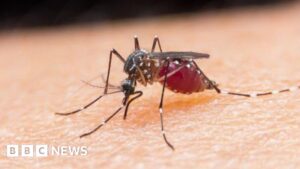Israeli strike in north Gaza kills 87, Hamas-run ministry says
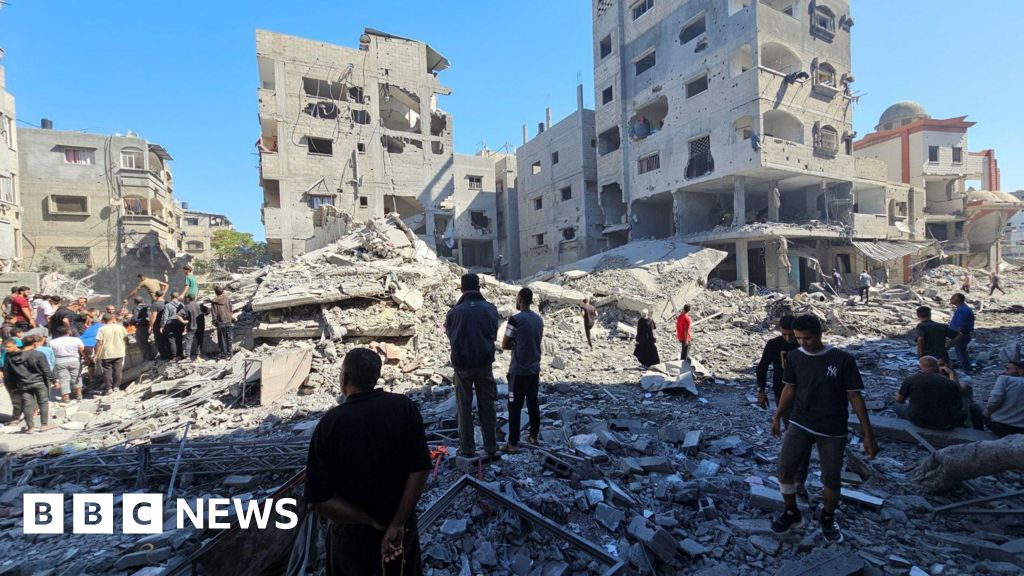
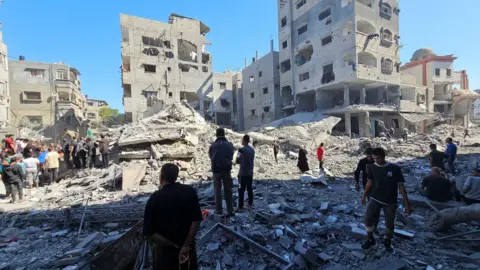 Reuters
ReutersGaza’s Hamas-run health ministry has said at least 87 people were killed and more than 40 injured in Saturday’s Israeli air strike on the city of Beit Lahiya in the north of the Palestinian enclave.
The ministry said a number of people were still under the rubble after a residential area was hit.
Israel said it was checking reports of casualties but added that earlier – lower – figures published by Hamas were “exaggerated”. In recent weeks, the Israel military has been carrying out intense bombardment of northern Gaza, saying it wanted to prevent Hamas fighters from regrouping there.
A senior UN official warned that the “nightmare in Gaza is intensifying” and the war “must stop now”.
The UN’s peace process co-ordinator, Tor Wennesland, said that “nowhere is safe in Gaza”.
In a statement, Tor Wennesland said he condemned the continuing attacks on civilians.
“This war must end, the hostages held by Hamas must be freed, the displacement of Palestinians must cease, and civilians must be protected wherever they are. Humanitarian aid must be delivered unimpeded,” he said.
In a statement on Sunday, Gaza’s Hamas-run health ministry revised its death toll from 73 to 87 after the Israeli strike on Beit Lahia.
The earlier casualty figures were provided by Hamas late on Saturday.
The ministry also said that ambulance crews were unable to reach the site of the Israeli strike.
The Israel Defense Forces (IDF) described the strike as a “precision” attack on a “Hamas terror target”. It told the BBC it was “doing everything possible to avoid causing harm to civilians”.
Dr Eid Sabbah, Kamal Adwan Hospital’s director of nursing, said the Israeli strike in Beit Lahia had completely destroyed several buildings, with “more than four, five residential blocks… razed to the ground”.
The strikes targeted an entire residential square, Dr Sabbah said, in between Abu Jidian roundabout and Al Qassam mosque.
Dr Sabbah added that dozens of people were killed and many were wounded “some of whom reached the hospital, some of whom remain under the rubble”.
He urged for an end to the “siege” on hospitals in northern Gaza and “for life to return to normal… before it’s too late, before our nation is exterminated”.
Several images – including the one below – have since emerged on social media showing the treatment of the injured from Beit Lahia at the Kamal Adwan Hospital.
The images have been verified by the BBC as being from the hospital.
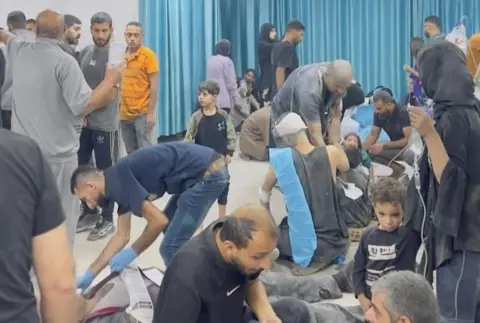 Supplied
SuppliedIsrael began a renewed military offensive in northern Gaza in early October, saying it is trying to prevent Hamas from regrouping in the area.
In particular, Israeli forces have surrounded and bombarded the densely-populated Jabalia area, which includes an urban refugee camp – with at least 33 people reported killed in a strike late on Friday.
Humanitarian groups have warned that virtually no aid has entered the area in the past few weeks. Israel’s own statistics show that aid deliveries to Gaza as a whole have collapsed when compared with the same period in September.
On Saturday, the UN’s top humanitarian official, Joyce Msuya, said that Palestinians in northern Gaza are enduring “unspeakable horrors” and called for these “atrocities” to stop.
Israel has repeatedly denied it is preventing humanitarian aid from entering Gaza – but on Tuesday the US told it to boost access within 30 days or risk having some American military assistance cut off.
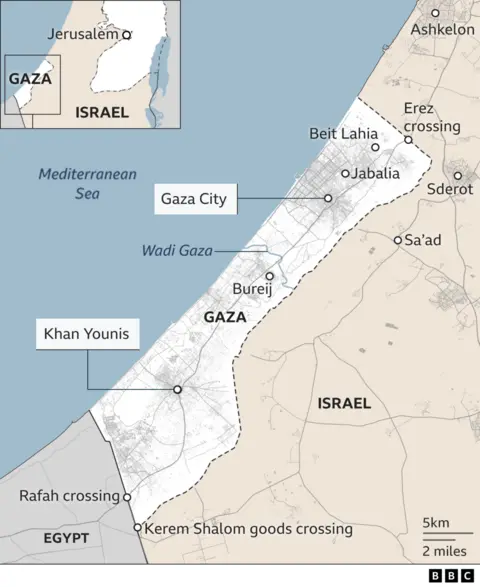
At least 42,603 people have been killed and 99,795 injured in Gaza since the war began last October, the Hamas-run authorities say.
The war began after Hamas attacked Israel on 7 October 2023, leaving around 1,200 people dead and 251 taken to Gaza as hostages. Israel vowed to destroy Hamas in response, launching a ground offensive in the enclave.
Elsewhere, Israel continued its air strikes against the Lebanese group Hezbollah in the southern suburbs of Beirut on Sunday.
In a statement, the IDF said: “Earlier this morning, the IAF [Israel’s air force] conducted an intelligence-based strike on a command centre of Hezbollah’s intelligence headquarters and an underground weapons workshop in Beirut”.
It added that several steps were taken to “reduce the possibility of civilian casualties”, including “issuing advance warnings to residents”.
The IDF also reported that about 160 rockets were fired from Lebanon into northern Israel.
Meanwhile, the Lebanese army said three of it soldiers were killed after a military vehicle was hit by an Israeli air strike in Nabatieh, southern Lebanon.
Israel has not yet commented.
Lebanon’s army has historically stayed out of cross-border clashes between Israel and Hezbollah – but a number of its troops have been killed in Israeli attacks since fighting escalated last month.
Hezbollah – a powerful militant group in Lebanon – says it has been firing on Israeli positions in solidarity with Hamas in Gaza.
Both Hezbollah and Hamas are backed by Iran.
#Israeli #strike #north #Gaza #kills #Hamasrun #ministry
News plays a pivotal role in our lives by keeping us informed and connected to the world. It serves as a critical source of information, offering updates on current events, politics, economics, science, and more. Through news, we gain awareness of global issues and local developments, helping us make informed decisions in our personal and professional lives. News also fosters discussion and debate, encouraging critical thinking and perspective-taking. Moreover, it promotes transparency and accountability among governments, businesses, and other institutions. In a rapidly changing world, staying updated with the news enables us to adapt to new challenges and opportunities, shaping our understanding of the complexities of society. Ultimately, news is not just about information; it empowers us to participate actively in the world around us, contributing to a more informed, engaged, and responsible global citizenry.
Health is fundamental to our well-being and quality of life, making it an essential aspect of daily existence. It encompasses physical, mental, and emotional aspects, influencing our ability to function effectively and enjoy life fully. Prioritizing health allows individuals to maintain optimal physical fitness, reducing the risk of diseases and promoting longevity. Mental health, equally crucial, affects our cognitive abilities, emotional stability, and overall happiness. Investing in preventive healthcare through exercise, balanced nutrition, and regular medical check-ups helps in early detection of potential health issues, ensuring timely intervention and treatment. Beyond individual benefits, a population’s health impacts societal productivity and economic stability. Governments and organizations worldwide emphasize public health initiatives to address pandemics, health disparities, and promote overall well-being. Ultimately, health serves as the foundation upon which we build our lives, influencing our ability to pursue goals, nurture relationships, and contribute meaningfully to society.
Money plays a crucial role in our lives as a means of financial security and freedom. It enables us to meet basic needs such as food, shelter, and healthcare, while also providing opportunities for education, travel, and personal growth. Beyond material comforts, money facilitates social connections and experiences that enrich our lives. It empowers individuals to invest in their futures, whether through savings, investments, or entrepreneurial ventures, thereby fostering economic stability and growth. However, the pursuit of wealth should also be balanced with ethical considerations, as money can influence relationships and societal dynamics. Responsible management of finances is key to achieving long-term goals and mitigating financial stress. Ultimately, while money is a tool for achieving aspirations and fulfilling desires, its true value lies in how it is utilized to improve both personal well-being and the broader community.
Earning Easy Money in 2024: Opportunities and Considerations 💸
In 2024, the landscape of earning easy money presents diverse opportunities, albeit with considerations. The digital age offers platforms for freelancing, online trading, and e-commerce, allowing individuals to leverage skills and creativity for financial gain. Cryptocurrency investments continue to allure with potential for quick profits, yet they entail high volatility and risk. Moreover, the rise of the gig economy enables flexible work arrangements through apps and websites, offering quick payouts but often without job security or benefits. Passive income streams such as rental properties and investments in stocks or bonds remain viable, but demand initial capital and ongoing management. Amid these options, caution is essential to avoid scams and unsustainable ventures promising overnight success. Ultimately, while the allure of easy money persists, informed decisions, diligence, and a long-term perspective are crucial for sustainable financial growth and security in the dynamic year ahead.


